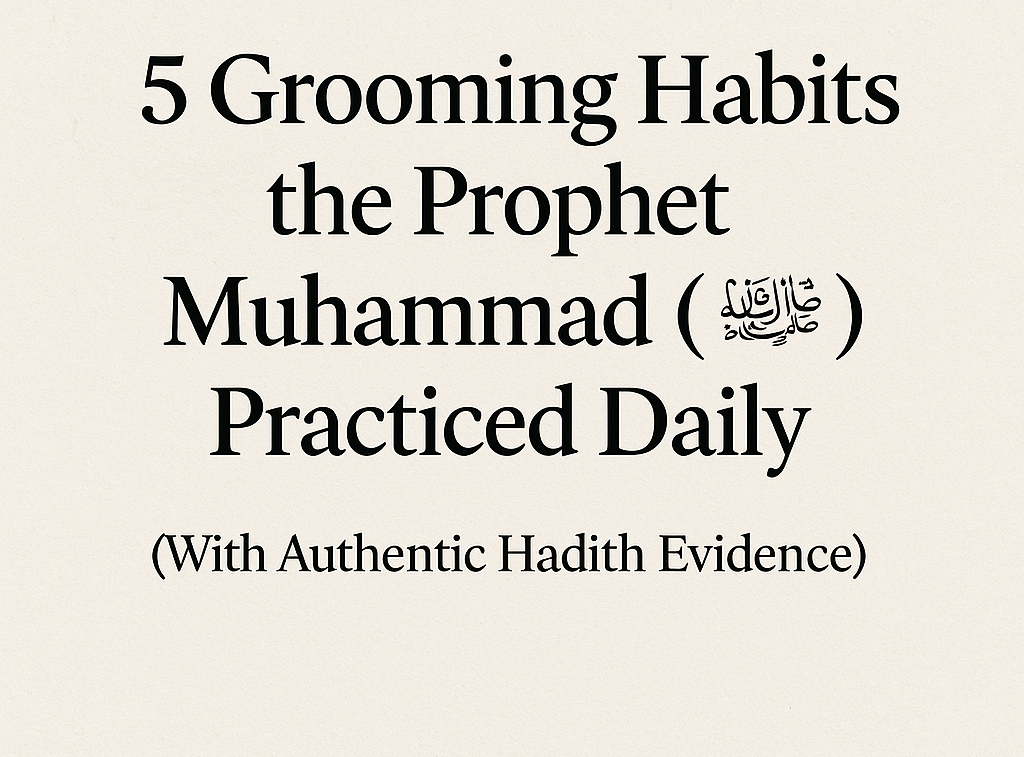5 Grooming Habits the Prophet Muhammad (ﷺ) Practiced Daily
Discover 5 daily grooming habits practiced by Prophet Muhammad ﷺ, supported by authentic hadith. Learn how to revive the Sunnah of personal care with verified Islamic teachings.
HALAL TALKHALAL GROOMING TIPSSKIN CAREDENTAL HYGIENE
Yusef Kareem
4/28/20253 min read


Introduction
In today's world, grooming is often treated like a shallow concern. But when we look at the life of Prophet Muhammad ﷺ, we see that personal care was deeply tied to spirituality, self-respect, and excellence (ihsan).
His habits teach us that honoring the body Allah gave us is a part of honoring Allah Himself.
Here are five grooming habits the Prophet ﷺ practiced regularly, supported by authentic narrations.
1. Using the Miswak Regularly
Hadith Evidence:
The Prophet ﷺ said:
"If I had not found it hard for my ummah, I would have ordered them to use the miswak for every prayer."
(Sahih al-Bukhari 887, Sahih Muslim 252)
Explanation:
He emphasized using the miswak so strongly that some companions thought it was almost obligatory.
He used it when waking up, before prayers, before reading Qur’an, and when entering his home.Modern Application:
Carrying a miswak or maintaining good oral hygiene today is a way to revive this Sunnah daily.
2. Applying Perfume and Prioritizing a Pleasant Scent
Hadith Evidence:
The Prophet ﷺ said:
"Perfume and women have been made dear to me, but the coolness of my eyes is in prayer."
(Sunan an-Nasa'i 3939, graded Sahih by al-Albani)
Another narration:
"The Prophet ﷺ loved perfume and often accepted it when offered."
(Sahih al-Bukhari 2582)
Explanation:
The Prophet ﷺ regularly applied fragrance before going out, for prayers, and in gatherings. Scholars mention he never rejected a gift of perfume.Modern Application:
Muslim men today can use alcohol-free perfumes (attar) or halal sprays, reviving the Sunnah of smelling pleasant as an act of respect toward others and oneself.
3. Keeping the Beard Maintained and Oiled
Hadith Evidence on Growing and Maintaining the Beard:
The Prophet ﷺ said:
"Trim the mustaches and let the beards grow; be different from the polytheists."
(Sahih al-Bukhari 5892, Sahih Muslim 259)
Hadith about Oiling the Beard:
Though there is no explicit authentic hadith that directly says "The Prophet oiled his beard daily", there are narrations about general personal grooming, including oiling:
Narrated by Jabir ibn Abdullah:
"The Prophet ﷺ used to anoint his hair with oil and cover it with a cloth."
(Sunan Abu Dawud 4159, Hasan)
Scholars infer that applying oil would include the beard because it was part of personal grooming.
Modern Caution:
Since there is no direct authentic hadith stating "the Prophet oiled his beard daily," we must phrase it carefully.
👉 Safer wording: "It is reported that the Prophet ﷺ would apply oil to his hair, and some scholars infer that his beard was included in this regular care."Modern Application:
Using natural oils (like olive or argan) helps maintain the beard, honors the Sunnah of growing it, and keeps one's appearance dignified.
4. Maintaining Neat Nails and Personal Hygiene
Hadith Evidence:
The Prophet ﷺ said:
"Five practices are characteristic of the fitrah: circumcision, shaving the pubic hair, cutting the nails, plucking the armpit hair, and trimming the mustache."
(Sahih al-Bukhari 5889, Sahih Muslim 257)
Timeline Evidence:
Anas (رضي الله عنه) narrated:
"The Prophet ﷺ set a time limit for us to cut the mustache, clip the nails, pluck the underarm hair, and shave the pubic hair: that we should not neglect it for more than forty nights."
(Sahih Muslim 258)
Explanation:
While clipping nails wasn’t necessarily a daily act, daily general cleanliness — washing, wiping sweat, combing hair — was part of his lifestyle.Modern Application:
Maintaining short nails, washing hands regularly, and keeping clean clothes are modern extensions of this Sunnah.
5. Wearing Clean and Presentable Clothing
Hadith Evidence:
The Prophet ﷺ said:
"Wear white clothes, for they are the best of your clothes, and shroud your dead in them."
(Sunan Abi Dawud 4061, Hasan)
Also, regarding dressing well:
Abdullah ibn Mas’ud (رضي الله عنه) narrated:
"No one will enter Paradise who has an atom’s weight of pride in his heart." A man said, “What if a man likes his clothes to look good and his shoes to look good?” The Prophet ﷺ replied:
"Allah is beautiful and loves beauty. Pride means rejecting the truth and looking down on people."
(Sahih Muslim 91)
Explanation:
The Prophet ﷺ preferred simplicity but was always clean and presentable. His garments were simple but washed, his appearance polished, his smell fragrant.Modern Application:
Clean, ironed clothes — even casual ones — revive the Sunnah of honoring yourself without arrogance.
Conclusion: Grooming as a Sign of Respect for Allah's Gifts
Personal grooming is not vanity. It's gratitude.
The Prophet Muhammad ﷺ taught us that caring for our bodies — through brushing teeth, perfuming ourselves, maintaining a beard, trimming nails, and wearing clean clothes — is part of living with dignity as a Muslim.
Every swipe of the miswak, every drop of oil, every trimmed nail, becomes an act of ibadah when it’s done with the right niyyah (intention).
Revive one Sunnah today. Revive dignity. Revive light.
Bring the Sunnah Into Your Daily Routine with Sunnah Scent
Reviving the grooming habits of the Prophet ﷺ starts with intention — and choosing pure, halal products.
At Sunnah Scent, we craft beard oils and grooming essentials inspired by prophetic traditions, using only natural, halal ingredients.
Honor the gift of your body the way the Prophet ﷺ taught us.
Explore Sunnah Scent today and elevate your daily Sunnah.
Halal grooming tips for Muslim men.
CONTACT
Subscribe
Email Us @ YusefKareem@halalgrooming.com
Text us @ (678) 276-3389
© 2025. All rights reserved.
We only send out emails once a week-ish.


